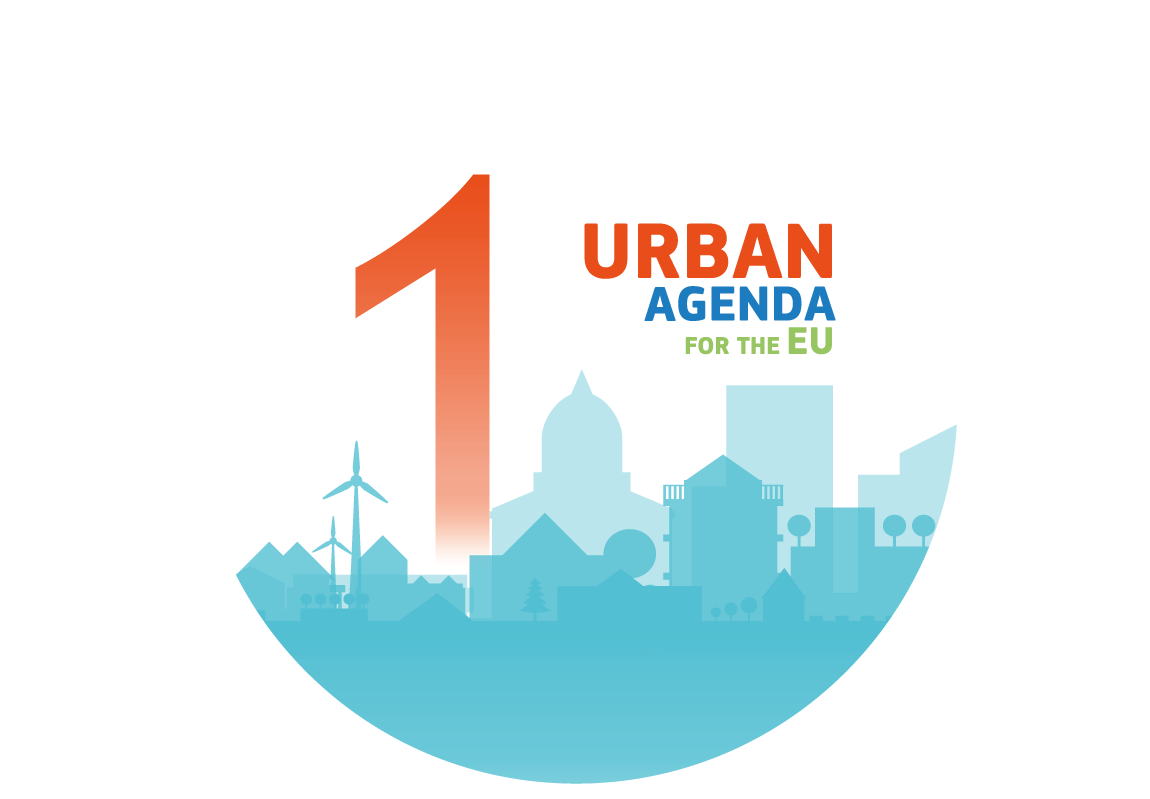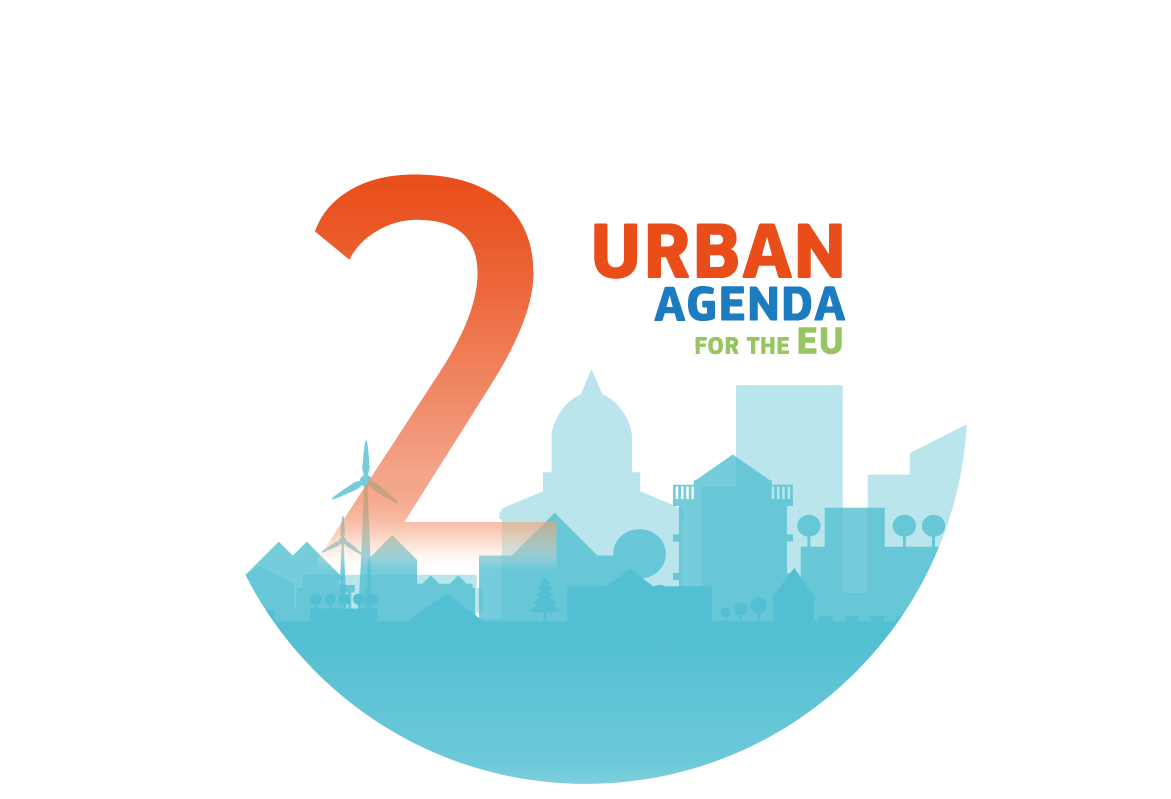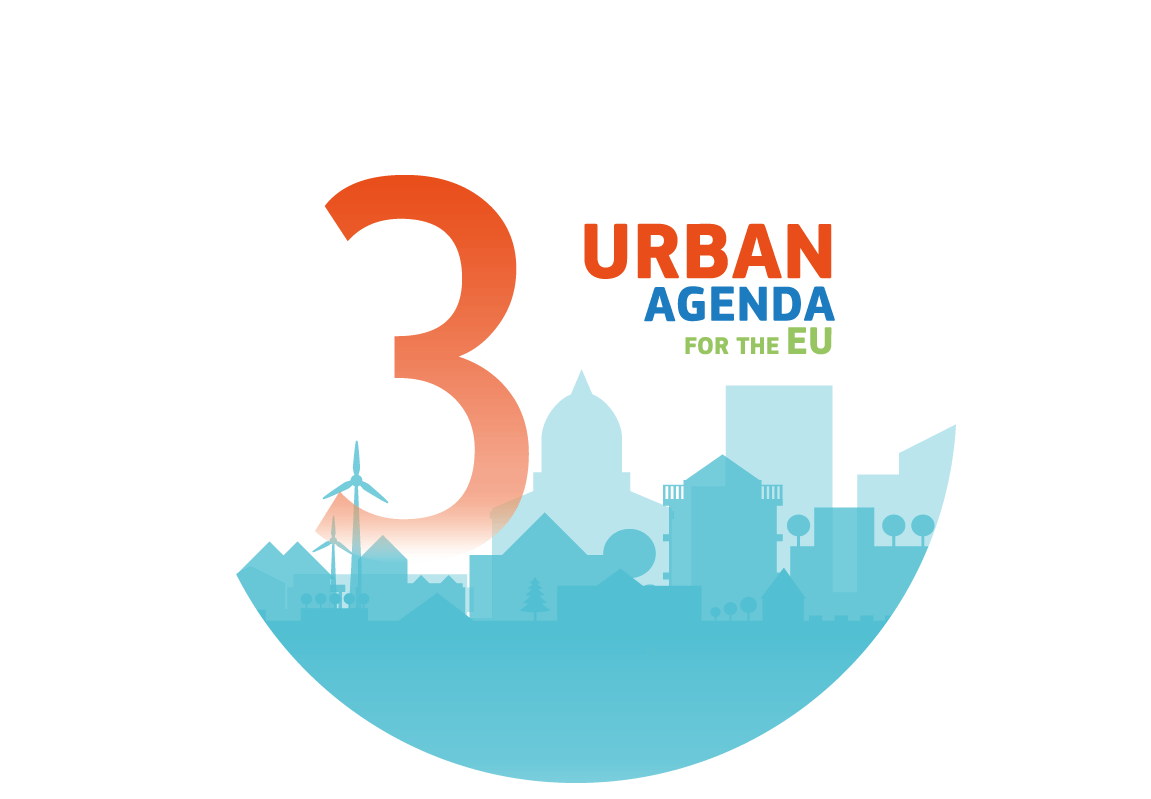The Urban Agenda
for the EU
The Urban Agenda for the EU represents a new multi-level working method, for urban policy and practice, promoting cooperation between Member States, cities, the European Commission, and other stakeholders.
It was launched in May 2016 with the Pact of Amsterdam and reconfirmed as a valuable initiative in November 2021, with the Ljubljana Agreement. In the 2021–2027 period, support to the Urban Agenda for the EU is provided under the European Urban Initiative.
What are the objectives of the Urban Agenda for the EU?
In the Pact of Amsterdam, the EU Ministers responsible for urban matters affirm that:
Realise the full potential of Urban Areas

The Urban Agenda for the EU aims to realise the full potential and contribution of urban areas towards achieving the objectives of the Union and related national priorities in full respect of subsidiarity and proportionality principles and competences.
Establish an integrated approach and contribute to territorial cohesion

The Urban Agenda for the EU strives to establish a more effective integrated and coordinated approach to EU policies and legislation with a potential impact on urban areas and also to contribute to territorial cohesion by reducing the socioeconomic gaps observed in urban areas and regions.
Involve Urban Authorities in the design of policies

The Urban Agenda for the EU strives to involve Urban Authorities in the design of policies, to mobilise Urban Authorities for the implementation of EU policies, and to strengthen the urban dimension in these policies.
 UAEU objective 1
UAEU objective 1
The Urban Agenda for the EU aims to realise the full potential and contribution of urban areas towards achieving the objectives of the Union and related national priorities in full respect of subsidiarity and proportionality principles and competences.
 UAEU objective 2
UAEU objective 2
The Urban Agenda for the EU strives to establish a more effective integrated and coordinated approach to EU policies and legislation with a potential impact on urban areas and also to contribute to territorial cohesion by reducing the socioeconomic gaps observed in urban areas and regions.
 UAEU objective 3
UAEU objective 3
The Urban Agenda for the EU strives to involve Urban Authorities in the design of policies, to mobilise Urban Authorities for the implementation of EU policies, and to strengthen the urban dimension in these policies.
What is the scope of the Urban Agenda for the EU?
The Urban Agenda for the EU scope is threefold. It focuses specifically on three pillars of EU policymaking and implementation:
The Urban Agenda for the EU focuses on a more effective and coherent implementation of existing policies, legislation, and instruments. The Urban Agenda for the EU will not initiate new regulation but will be regarded as an informal contribution to the design of future and revision of existing regulation, notably at EU level, in order for it to better reflect urban needs, practices and responsibilities. It recognises the need to avoid potential bottlenecks and minimise administrative burdens for urban authorities.
The Urban Agenda for the EU will contribute to identifying, supporting, integrating, and improving traditional, innovative and user-friendly sources of funding for urban areas at the relevant institutional level, including from European structural and investment funds (ESIF) (in accordance with the legal and institutional structures already in place) in view of achieving effective implementation of interventions in urban areas. The Urban Agenda for the EU will not create new or increased EU funding aimed at higher allocations for urban authorities. However, it will draw from and convey lessons learned on how to improve funding opportunities for urban authorities across all EU policies and instruments, including Cohesion Policy.
The Urban Agenda for the EU will contribute to enhancing the knowledge base on urban issues and exchange of best practices and knowledge. Reliable data is important for portraying the diversity of structures and tasks of Urban Authorities, for evidence-based urban policy making, as well as for providing tailor-made solutions to major challenges. Knowledge on how Urban Areas evolve is fragmented and successful experiences can be better exploited. Initiatives taken in this context will be in accordance with the relevant EU legislation on data protection, the reuse of public sector information and the promotion of big, linked and open data.
What are the Thematic Partnerships?
Thematic Partnerships are the key delivery mechanism within the Urban Agenda for the EU. They include representatives from various governmental levels and stakeholders.
The Thematic Partnerships have been launched in several steps since 2016:
Explore the members of the Urban Agenda for the EU
The interactive map below includes all official members that have participated in the Urban Agenda for the EU since its creation in 2016. These are grouped in two main layers by Partnerships and by typologies. Using the legend on the up-right corner, you can toggle on or off the two layers. You can select to view all the UAEU Partnerships together, or just some of them (using the Partnership sub-layers). Similarly, you can select to see just some of the typologies of organisations and not all of them at the same time (e.g. just the sub-layer of cities).
To view the map in full screen, click here.
What do Partnerships do?
The thematic Partnerships are defining and then implementing the Actions defined in the Action Plans.
In summer 2017, the first draft Action Plans from the pilot Partnerships were shared in a Public Feedback, informing the creation of the final Action Plans. This process of consulting the public was repeated by all 14 Partnerships and is an important milestone in the process of developing their Action Plans.
All the Action Plans can be viewed on the respective Partnership Pages.
What are the actions implemented by the Partnerships?
Monitoring Table of Actions (September 2025)

The Monitoring Table of Actions for the Urban Agenda for the EU offers a thorough overview of initiatives carried out by the Thematic Partnerships.
In addition to outlining specific actions, it highlights the interconnections between these efforts and cross-cutting issues. This framework enhances comprehension of the ongoing work, promoting transparency and coherence throughout the implementation process.
Download the Monitoring Table of Actions
Download the Monitoring Table of Actions Infographic
Monitoring Table of Actions (November 2024)

The Monitoring Table of Actions for the Urban Agenda for the EU offers a thorough overview of initiatives carried out by the Thematic Partnerships.
In addition to outlining specific actions, it highlights the interconnections between these efforts and cross-cutting issues. This framework enhances comprehension of the ongoing work, promoting transparency and coherence throughout the implementation process.
Download the Monitoring Table of Actions
Download the Monitoring Table of Actions Infographic
Monitoring Table of Actions (September 2021)

The Monitoring Table of Actions for the Urban Agenda for the EU offers a thorough overview of initiatives carried out by the Thematic Partnerships.
In addition to outlining specific actions, it highlights the interconnections between these efforts and cross-cutting issues. This framework enhances comprehension of the ongoing work, promoting transparency and coherence throughout the implementation process.
Download the Monitoring Table of Actions
Monitoring Table of Actions (previous versions)
 MTA September 2025
MTA September 2025
The Monitoring Table of Actions for the Urban Agenda for the EU offers a thorough overview of initiatives carried out by the Thematic Partnerships.
In addition to outlining specific actions, it highlights the interconnections between these efforts and cross-cutting issues. This framework enhances comprehension of the ongoing work, promoting transparency and coherence throughout the implementation process.
Download the Monitoring Table of Actions
Download the Monitoring Table of Actions Infographic
 Monitoring of Actions Infographic
Monitoring of Actions Infographic
The Monitoring Table of Actions for the Urban Agenda for the EU offers a thorough overview of initiatives carried out by the Thematic Partnerships.
In addition to outlining specific actions, it highlights the interconnections between these efforts and cross-cutting issues. This framework enhances comprehension of the ongoing work, promoting transparency and coherence throughout the implementation process.
Download the Monitoring Table of Actions
Download the Monitoring Table of Actions Infographic
 Monitoring Table of Actions
Monitoring Table of Actions
The Monitoring Table of Actions for the Urban Agenda for the EU offers a thorough overview of initiatives carried out by the Thematic Partnerships.
In addition to outlining specific actions, it highlights the interconnections between these efforts and cross-cutting issues. This framework enhances comprehension of the ongoing work, promoting transparency and coherence throughout the implementation process.
Download the Monitoring Table of Actions
 Monitoring Table of Actions
Monitoring Table of Actions
EUI Support Services to the Partnerships
One of the objectives of the European Urban Initiative (EUI) is to provide support to the Urban Agenda for the EU as indicated in the Pact of Amsterdam and Ljubljana Agreement and further detailed in Annex 1b) to the Contribution Agreement between the Commission and the Region Hauts-de-France (see section 4, page 33).
The factsheet summarizes the Support Services Package that is offered by the EUI Permanent Secretariat on behalf of the European Commission in the 2021-2027 funding period to the members of the UAEU Thematic Partnerships. The Support Services comprise: Administrative Support (Thematic Partnership Officer), Initiation Phase, Provision of Expertise, Travel and Accommodation Support for Urban Authorities, Communication and Dissemination Support, and Creation of Synergies for the UAEU.
What are the key documents of the Urban Agenda for the EU?
Policy documents defining the UAEU
Pact of Amsterdam

The Pact of Amsterdam, launched in 2016, laid the groundwork for the EU's Urban Agenda. It aimed to tackle urban challenges through collaboration among member states, cities, and stakeholders. Emphasizing sustainability and inclusivity, it fostered joint actions to improve governance, infrastructure, and social cohesion. The pact promoted dialogue and knowledge exchange, aiming to build resilient, vibrant cities for long-term prosperity.
Download the Pact of Amsterdam
Ljubjana Agreement

The Ljubljana Agreement, published in 2021 as part of the Urban Agenda for the EU, updates policies to prioritize sustainability and resilience. It fosters collaboration for carbon neutrality, social equity, and inclusive urban development among member states and stakeholders.
Download the Ljubjana Agreement
Multiannual Working Programme for the Urban Agenda for the EU

The Working Programme of the Urban Agenda for the EU (UAEU) describes the Operational Framework of the UAEU in detail: the working method, concrete actions and the themes of the UAEU. It supports the Pact of Amsterdam (2016) for the period 2016–2021.
The New Leipzig Charter and its Implementation Document reaffirmed the Pact of Amsterdam and call for continuation of cooperation, coherence and continuity within and between Trio Presidency Programmes.
A Multiannual Working Programme has therefore been prepared for the period 2022–2026. It provides a framework for the planning, implementation and monitoring of the UAEU. The DGUM can already suggest amendments for approval by the Ministers responsible for Urban Matters before 2026 if relevant.
Download the Multiannual Working Programme
Agreements on the Urban Matters Session about the Urban Agenda for the EU

On 14 November 2023 the Spanish Presidency organised an informal meeting assembled Ministers responsible for Urban Matter in Gijon with the aim of further strengthening collaboration and continuing to support the Urban Agenda for the EU (UAEU). The Agreements on the Urban Matters Session about the Urban Agenda for the EU defines next steps for the future and several operational agreements for its implementation.
 Amsterdam
Amsterdam
The Pact of Amsterdam, launched in 2016, laid the groundwork for the EU's Urban Agenda. It aimed to tackle urban challenges through collaboration among member states, cities, and stakeholders. Emphasizing sustainability and inclusivity, it fostered joint actions to improve governance, infrastructure, and social cohesion. The pact promoted dialogue and knowledge exchange, aiming to build resilient, vibrant cities for long-term prosperity.
Download the Pact of Amsterdam
 Ljubjana
Ljubjana
The Ljubljana Agreement, published in 2021 as part of the Urban Agenda for the EU, updates policies to prioritize sustainability and resilience. It fosters collaboration for carbon neutrality, social equity, and inclusive urban development among member states and stakeholders.
Download the Ljubjana Agreement
 Multiannual Working Programme
Multiannual Working Programme
The Working Programme of the Urban Agenda for the EU (UAEU) describes the Operational Framework of the UAEU in detail: the working method, concrete actions and the themes of the UAEU. It supports the Pact of Amsterdam (2016) for the period 2016–2021.
The New Leipzig Charter and its Implementation Document reaffirmed the Pact of Amsterdam and call for continuation of cooperation, coherence and continuity within and between Trio Presidency Programmes.
A Multiannual Working Programme has therefore been prepared for the period 2022–2026. It provides a framework for the planning, implementation and monitoring of the UAEU. The DGUM can already suggest amendments for approval by the Ministers responsible for Urban Matters before 2026 if relevant.
Download the Multiannual Working Programme
 Gijon
Gijon
On 14 November 2023 the Spanish Presidency organised an informal meeting assembled Ministers responsible for Urban Matter in Gijon with the aim of further strengthening collaboration and continuing to support the Urban Agenda for the EU (UAEU). The Agreements on the Urban Matters Session about the Urban Agenda for the EU defines next steps for the future and several operational agreements for its implementation.
Policy documents linked to UAEU
New Leipzig Charter

The New Leipzig Charter, adopted in November 2020 under the German Presidency, is a key policy framework for sustainable urban development in Europe and strongly aligned with the Cohesion Policy. Emphasizing cities need to establish integrated sustainable urban development strategies to ensure an implementation for the city as a whole. Member States agreed to implement the Charter in their national or regional urban policies.
Download the New Leipzig Charter
New Leipzig Charter - Implementing Document

The document was adopted in November 2020 and accompanies the New Leipzig Charter. It intends to guide the next phase of the Urban Agenda for the EU according to the renewed parameters set out in the New Leipzig Charter.
Download the New Leipzig Charter - Implementing Document
Territorial Agenda 2030

The Territorial Agenda 2030 is a strategic framework adopted in 2020, which underlines the importance of and provides orientation for strategic spatial planning and calls for strengthening the territorial dimension of sector policies at all governance levels. It promotes an inclusive and sustainable future for all places and help achieve Sustainable Development Goals in Europe. The Territorial Agenda contributes to key European objectives of a Just and Green Europe.
Download the Territorial Agenda 2030
 Leipzig
Leipzig
The New Leipzig Charter, adopted in November 2020 under the German Presidency, is a key policy framework for sustainable urban development in Europe and strongly aligned with the Cohesion Policy. Emphasizing cities need to establish integrated sustainable urban development strategies to ensure an implementation for the city as a whole. Member States agreed to implement the Charter in their national or regional urban policies.
Download the New Leipzig Charter
 Leipzig
Leipzig
The document was adopted in November 2020 and accompanies the New Leipzig Charter. It intends to guide the next phase of the Urban Agenda for the EU according to the renewed parameters set out in the New Leipzig Charter.
Download the New Leipzig Charter - Implementing Document
 EU Cohesion
EU Cohesion
The Territorial Agenda 2030 is a strategic framework adopted in 2020, which underlines the importance of and provides orientation for strategic spatial planning and calls for strengthening the territorial dimension of sector policies at all governance levels. It promotes an inclusive and sustainable future for all places and help achieve Sustainable Development Goals in Europe. The Territorial Agenda contributes to key European objectives of a Just and Green Europe.
Download the Territorial Agenda 2030
Studies regarding the implementation of the UAEU
Review of the contributions of the Urban Agenda for the EU to the implementation of the New Urban Agenda

The Pact of Amsterdam (2016) states that the Urban Agenda for the EU (UAEU) should ‘contribute to the implementation of the UN 2030 Agenda for Sustainable Development, and the global New Urban Agenda (NUA), as part of the Habitat III process’. In this context, the European Commission launched a review of the UAEU contributions to the NUA in 2021. Some of the main findings highlight that the UAEU and the NUA are strongly interlinked and share key urban governance principles as well as address similar challenges (urban poverty, climate adaptation, or urban mobility).
Download the Review of the UAEU contributions to the New Urban Agenda
Assessment Study of the Urban Agenda for the EU

This study, which was published in November 2019, provides a comprehensive evaluation of the implementation and effectiveness of the Urban Agenda for the European Union (UAEU). It assesses the extent to which the UAEU has achieved its objectives outlined in the Pact of Amsterdam, highlighting strengths, challenges, and areas for improvement. Conducted by external consultants, the study incorporates both secondary data and primary data obtained through online consultations and in-depth interviews with UAEU stakeholders and participants.
Urban Agenda for the EU: Multi-level governance in action

This brochure was published in 2021 and highlights the Urban Agenda for the EU's role in innovative governance and New Urban Agenda (NUA) implementation, featuring diverse actions and achievements. It references the New Leipzig Charter, Ljubljana Agreement, and UAEU's NUA contributions. Additionally, it covers UAEU cities' COVID-19 responses and includes a series of articles published in 2021. Organised by Thematic Partnerships, it promotes integrated approaches to address cross-cutting issues and support the three pillars of better regulation, better funding, and better knowledge. The brochure also explores EU programs and initiatives supporting sustainable urban development, alongside Cohesion Policy.
Download Urban Agenda for the EU: Multi-level governance in action
 New Urban Agenda
New Urban Agenda
The Pact of Amsterdam (2016) states that the Urban Agenda for the EU (UAEU) should ‘contribute to the implementation of the UN 2030 Agenda for Sustainable Development, and the global New Urban Agenda (NUA), as part of the Habitat III process’. In this context, the European Commission launched a review of the UAEU contributions to the NUA in 2021. Some of the main findings highlight that the UAEU and the NUA are strongly interlinked and share key urban governance principles as well as address similar challenges (urban poverty, climate adaptation, or urban mobility).
Download the Review of the UAEU contributions to the New Urban Agenda
 Assessment study
Assessment study
This study, which was published in November 2019, provides a comprehensive evaluation of the implementation and effectiveness of the Urban Agenda for the European Union (UAEU). It assesses the extent to which the UAEU has achieved its objectives outlined in the Pact of Amsterdam, highlighting strengths, challenges, and areas for improvement. Conducted by external consultants, the study incorporates both secondary data and primary data obtained through online consultations and in-depth interviews with UAEU stakeholders and participants.
 Urban Agenda Brochure 2021
Urban Agenda Brochure 2021
This brochure was published in 2021 and highlights the Urban Agenda for the EU's role in innovative governance and New Urban Agenda (NUA) implementation, featuring diverse actions and achievements. It references the New Leipzig Charter, Ljubljana Agreement, and UAEU's NUA contributions. Additionally, it covers UAEU cities' COVID-19 responses and includes a series of articles published in 2021. Organised by Thematic Partnerships, it promotes integrated approaches to address cross-cutting issues and support the three pillars of better regulation, better funding, and better knowledge. The brochure also explores EU programs and initiatives supporting sustainable urban development, alongside Cohesion Policy.
Download Urban Agenda for the EU: Multi-level governance in action
Visual identity
The Urban Agenda follows a defined visual identity that should be respected in all representations of the initiative. The brandbook and visual assets are available for consultation and download.